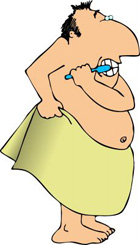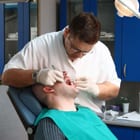 Looking after your teeth really doesn’t take much effort when you consider the consequences of not doing it properly, yet so many of us fall short of the recommended standards of cleaning. It is very easy when it comes to our teeth to assume that they are fine because they are causing no immediate problems, but this can be very deceptive and dangerous.
Looking after your teeth really doesn’t take much effort when you consider the consequences of not doing it properly, yet so many of us fall short of the recommended standards of cleaning. It is very easy when it comes to our teeth to assume that they are fine because they are causing no immediate problems, but this can be very deceptive and dangerous.
Tooth decay and gum disease occur very gradually over time as consistent poor hygiene allows plaque acid to erode enamel and irritate gum tissue. This may not be immediately painful and you may not realise it is happening but the longer you leave it the more serious it will become. It is therefore very necessary to ensure that you are cleaning your teeth properly to remove plaque and limit the threat of dental disease.
Effective oral hygiene has three main aspects. The most important is brushing which dentists recommend you should do at least twice a day for three minutes to remove plaque from the surface of the teeth. Brushing should ideally be carried out using a soft bristled brush so as not to erode any gum tissue unnecessarily, and the head of the brush should be angled at forty-five degrees to the gums.
Next to brushing is flossing, which is equally as important, as it removes plaque and food debris from the difficult to reach areas between the teeth and around their base. By not flossing you may experience decay in these areas that are difficult to see. Lastly, and most obviously is to make sure that you visit the dentist on a regular basis. A Central Leeds dentist can make sure that no decay is taking pace and can address any issues before they become too serious. By making just these few changes you could vastly improve your chances of avoiding unpleasant dental concerns.





 In the fight against dental decay there are several key defences. The most important is regular and correct brushing and flossing of teeth. Brushing and flossing help to fight plaque, a filmy substance made up of bacteria and other debris, that covers the teeth and attacks the enamel. If plaque is not removed by brushing it will break down enamel causing tooth decay. This can lead to painful toothaches and abscesses that can lead to tooth loss. Flossing is particularly important for removing plaque and food debris from between teeth that causes tooth decay and is also responsible for 90 per cent of cases of bad breath. If allowed to remain plaque will also transform into tartar, a hard yellow/brown substance that also destroys enamel but that is impossible to remove by conventional cleaning.
In the fight against dental decay there are several key defences. The most important is regular and correct brushing and flossing of teeth. Brushing and flossing help to fight plaque, a filmy substance made up of bacteria and other debris, that covers the teeth and attacks the enamel. If plaque is not removed by brushing it will break down enamel causing tooth decay. This can lead to painful toothaches and abscesses that can lead to tooth loss. Flossing is particularly important for removing plaque and food debris from between teeth that causes tooth decay and is also responsible for 90 per cent of cases of bad breath. If allowed to remain plaque will also transform into tartar, a hard yellow/brown substance that also destroys enamel but that is impossible to remove by conventional cleaning. It is very likely that any visit to the dentist today, will also involve a visit to the dental hygienist. This is a fairly new system of treatment that is being employed, but one that can greatly improve its quality. Dental hygienists use treatments called scaling and polishing to professionally clean teeth. These processes remove excess plaque and tartar that cannot be removed by conventional brushing.
It is very likely that any visit to the dentist today, will also involve a visit to the dental hygienist. This is a fairly new system of treatment that is being employed, but one that can greatly improve its quality. Dental hygienists use treatments called scaling and polishing to professionally clean teeth. These processes remove excess plaque and tartar that cannot be removed by conventional brushing.

